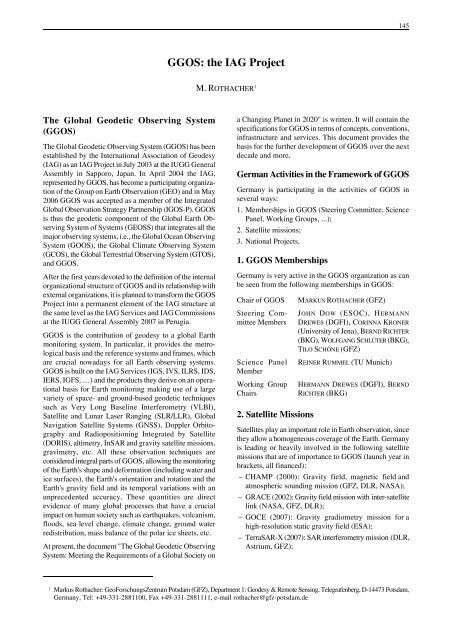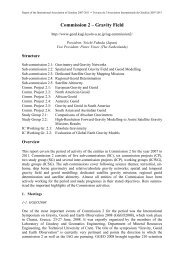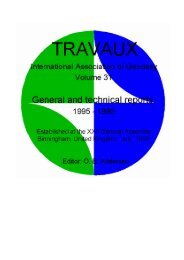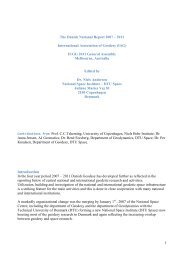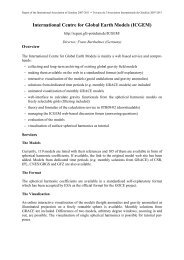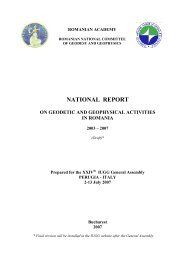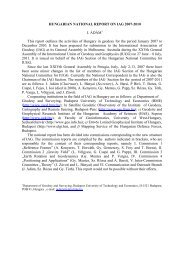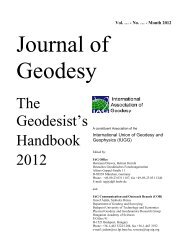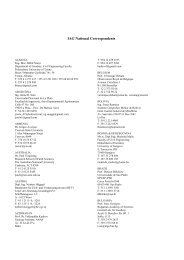NATIONAL REPORT OF THE FEDERAL REPUBLIC OF ... - IAG Office
NATIONAL REPORT OF THE FEDERAL REPUBLIC OF ... - IAG Office
NATIONAL REPORT OF THE FEDERAL REPUBLIC OF ... - IAG Office
You also want an ePaper? Increase the reach of your titles
YUMPU automatically turns print PDFs into web optimized ePapers that Google loves.
The Global Geodetic Observing System<br />
(GGOS)<br />
The Global Geodetic Observing System (GGOS) has been<br />
established by the International Association of Geodesy<br />
(<strong>IAG</strong>) as an <strong>IAG</strong> Project in July 2003 at the IUGG General<br />
Assembly in Sapporo, Japan. In April 2004 the <strong>IAG</strong>,<br />
represented by GGOS, has become a participating organization<br />
of the Group on Earth Observation (GEO) and in May<br />
2006 GGOS was accepted as a member of the Integrated<br />
Global Observation Strategy Partnership (IGOS-P). GGOS<br />
is thus the geodetic component of the Global Earth Observing<br />
System of Systems (GEOSS) that integrates all the<br />
major observing systems, i.e., the Global Ocean Observing<br />
System (GOOS), the Global Climate Observing System<br />
(GCOS), the Global Terrestrial Observing System (GTOS),<br />
and GGOS.<br />
After the first years devoted to the definition of the internal<br />
organizational structure of GGOS and its relationship with<br />
external organizations, it is planned to transform the GGOS<br />
Project into a permanent element of the <strong>IAG</strong> structure at<br />
the same level as the <strong>IAG</strong> Services and <strong>IAG</strong> Commissions<br />
at the IUGG General Assembly 2007 in Perugia.<br />
GGOS is the contribution of geodesy to a global Earth<br />
monitoring system. In particular, it provides the metrological<br />
basis and the reference systems and frames, which<br />
are crucial nowadays for all Earth observing systems.<br />
GGOS is built on the <strong>IAG</strong> Services (IGS, IVS, ILRS, IDS,<br />
IERS, IGFS, …) and the products they derive on an operational<br />
basis for Earth monitoring making use of a large<br />
variety of space- and ground-based geodetic techniques<br />
such as Very Long Baseline Interferometry (VLBI),<br />
Satellite and Lunar Laser Ranging (SLR/LLR), Global<br />
Navigation Satellite Systems (GNSS), Doppler Orbitography<br />
and Radiopositioning Integrated by Satellite<br />
(DORIS), altimetry, InSAR and gravity satellite missions,<br />
gravimetry, etc. All these observation techniques are<br />
considered integral parts of GGOS, allowing the monitoring<br />
of the Earth's shape and deformation (including water and<br />
ice surfaces), the Earth's orientation and rotation and the<br />
Earth's gravity field and its temporal variations with an<br />
unprecedented accuracy. These quantities are direct<br />
evidence of many global processes that have a crucial<br />
impact on human society such as earthquakes, volcanism,<br />
floods, sea level change, climate change, ground water<br />
redistribution, mass balance of the polar ice sheets, etc.<br />
At present, the document "The Global Geodetic Observing<br />
System: Meeting the Requirements of a Global Society on<br />
GGOS: the <strong>IAG</strong> Project<br />
M. ROTHACHER 1<br />
1 Markus Rothacher: GeoForschungsZentrum Potsdam (GFZ), Department 1: Geodesy & Remote Sensing, Telegrafenberg, D-14473 Potsdam,<br />
Germany, Tel: +49-331-2881100, Fax +49-331-2881111, e-mail rothacher@gfz-potsdam.de<br />
145<br />
a Changing Planet in 2020" is written. It will contain the<br />
specifications for GGOS in terms of concepts, conventions,<br />
infrastructure and services. This document provides the<br />
basis for the further development of GGOS over the next<br />
decade and more.<br />
German Activities in the Framework of GGOS<br />
Germany is participating in the activities of GGOS in<br />
several ways:<br />
1. Memberships in GGOS (Steering Committee, Science<br />
Panel, Working Groups, ...);<br />
2. Satellite missions;<br />
3. National Projects.<br />
1. GGOS Memberships<br />
Germany is very active in the GGOS organization as can<br />
be seen from the following memberships in GGOS:<br />
Chair of GGOS MARKUS ROTHACHER (GFZ)<br />
Steering Committee<br />
Members<br />
Science Panel<br />
Member<br />
Working Group<br />
Chairs<br />
2. Satellite Missions<br />
JOHN DOW (ESOC), HERMANN<br />
DREWES (DGFI), CORINNA KRONER<br />
(University of Jena), BERND RICHTER<br />
(BKG), WOLFGANG SCHLÜTER (BKG),<br />
TILO SCHÖNE (GFZ)<br />
REINER RUMMEL (TU Munich)<br />
HERMANN DREWES (DGFI), BERND<br />
RICHTER (BKG)<br />
Satellites play an important role in Earth observation, since<br />
they allow a homogeneous coverage of the Earth. Germany<br />
is leading or heavily involved in the following satellite<br />
missions that are of importance to GGOS (launch year in<br />
brackets, all financed):<br />
– CHAMP (2000): Gravity field, magnetic field and<br />
atmospheric sounding mission (GFZ, DLR, NASA);<br />
– GRACE (2002): Gravity field mission with inter-satellite<br />
link (NASA, GFZ, DLR);<br />
– GOCE (2007): Gravity gradiometry mission for a<br />
high-resolution static gravity field (ESA);<br />
– TerraSAR-X (2007): SAR interferometry mission (DLR,<br />
Astrium, GFZ);


